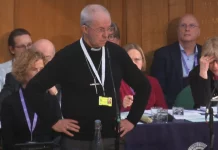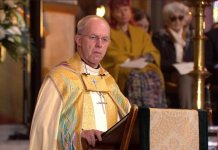HOSE of us who are seeking a formal settlement to resolve the Church of England’s endless conversations on same-sex sexual relationships have not yet persuaded enough people. We have been heard to make demands that would benefit only us and lead the Church into schism rather than seek a way forward that could benefit us all and keep the Church of England together.
But the most recent meeting of the General Synod (Synod, 1 March) helped me to see that we all need a uniting settlement. The paperwork, questions, conversations, speeches, and votes made me realise, slowly, that most of us are looking for the same six things, which, I believe, we can unite around.
We all want doctrine and liturgy that gives us the freedom to do and say what we believe in. If you want same-sex marriage, you know that you need to change Canon B30 some time soon, and yet cannot see how that will happen any time soon. If you cannot, in good conscience, accept same-sex sexual relationships, you are unhappy with the ambiguous Prayers of Love and Faith, which many see as undermining current church teaching on marriage and sex.
Even if you are just concerned about the following of the proper processes, you do not like the gap that seems to be appearing between our doctrine and liturgy. A uniting settlement could introduce transparent changes in ways that are legally robust — including protections for people’s consciences.
WE WOULD all like episcopal oversight and care that enables us to flourish in mission, supporting our beliefs and practice. Instead, we have a postcode lottery: a vicar in one diocese who wishes to use the new prayers is advised by their bishop not to, and is left feeling unsupported. Yet so is the celibate, gay person in a diocese where the bishop is vocal in support of same-sex marriage.
How can any bishop realistically hope to be a focus of unity in a diocese in which every church and cleric is being asked to make up its mind on use of the divisive prayers? A uniting settlement could mean episcopal powers legally transferred to provide oversight for those who found themselves in disagreement with their current episcopal Ordinary.
We all want pathways into, and training for, ministry which do not discriminate against us or impose views that go against our consciences. But the contentious Issues in Human Sexuality is still being used. Intrusive questions about their sex lives are still a reality for gay ordinands and clerics.
At the same time, ordinands who oppose the Prayers of Love and Faith are being put under pressure to change their minds. Nationally, the number of ordinands is in free fall: some need to know soon whether they will be allowed to marry their same-sex partners; others whether the Church’s direction of travel means that they cannot, in good conscience, be ordained in it. A uniting settlement could include pastoral guidance and enforceable protections that bring real confidence for all.
We all need relational structures that do not stop us benefiting from other perspectives, or force us into support of ministry with which we disagree. Churches of differing convictions are withholding parish share because they cannot support what other parishes in their area are doing. Others of us are just struggling to raise levels of giving among congregations who feel increasingly ill at ease with where the Church of England now finds itself.
A uniting settlement could establish active partnerships between richer and poorer parishes, who can support each other fully, and enable new patterns of relationships in deaneries and dioceses that are focused on the many ways in which they can still work happily together.
WE ARE all looking for firm reassurances that our churches will be able to appoint leaders who share our theological convictions and pastoral practice, and that diocesan and national leaders will be representative of all.
Concerns were raised in the Synod about congregations whose own stances did not match those of their church’s patron. The complexity of multi-parish benefices is clearly a problem. Many of us serve in dioceses where not a single member of the senior staff team represents our perspective. This makes us feel excluded and vulnerable.
Read it all in the Church Times
Ed Shaw is a lay representative of Bristol diocese on the General Synod and a co-chair of the Church of England Evangelical Council.










